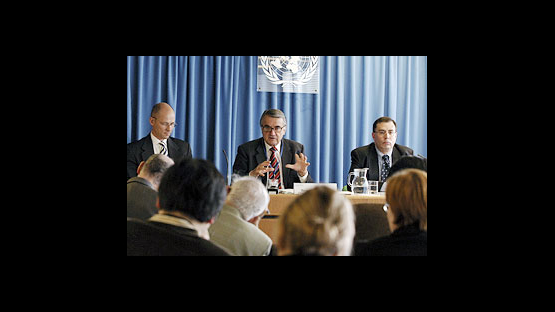An international Expert Group has released the findings of its extensive look at the world's civil nuclear fuel cycle, citing five approaches to strengthen controls over sensitive nuclear materials and technologies of proliferation concern. At a press briefing in Vienna today, Mr. Bruno Pellaud, the Group's Chairman and former Head of IAEA Safeguards, said multilateral approaches are "setting the nuclear agenda" and urged concerted action among governments.
"Such approaches are needed and worth pursuing, on both security and economic grounds," he said, in summing up the Group's consensus. “A joint nuclear facility with multinational staff puts all participants under a greater scrutiny from peers and partners, a fact that strengthens non-proliferation and security…Moreover, they have the potential to facilitate the continued use of nuclear energy for peaceful purposes." He noted that multilateral approaches already are followed in Europe, for example, and said they merit close consideration in South Asia and other regions.
The Group's report -- Multilateral Approaches to the Nuclear Fuel Cycle -- was commissioned by IAEA Director General Mohamed ElBaradei in June 2004, following his suggestion that wide dissemination of the most proliferation sensitive parts of the nuclear fuel cycle could be the "Achilles’ heel" of the nuclear non-proliferation regime.
The report outlines five approaches to strengthen controls over fuel enrichment, reprocessing, spent fuel repositories and spent fuel storage. They are:
The Expert Group included representatives from 26 countries who examined the nuclear fuel cycle and multinational approaches at meetings convened during a seven month period. The Group's report has been sent to the IAEA's 138 Member States and will be more widely circulated for discussion, including to the May 2005 Review Conference of 189 States party to the global Nuclear Non-Proliferation Treaty (NPT). See Story Resources for more information and background.


